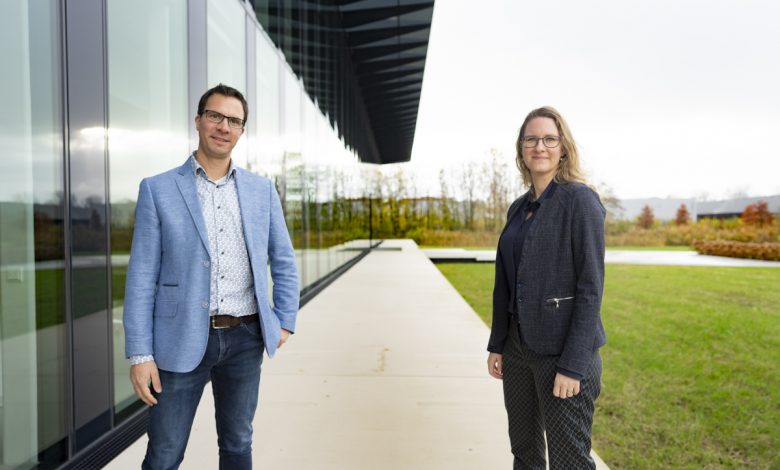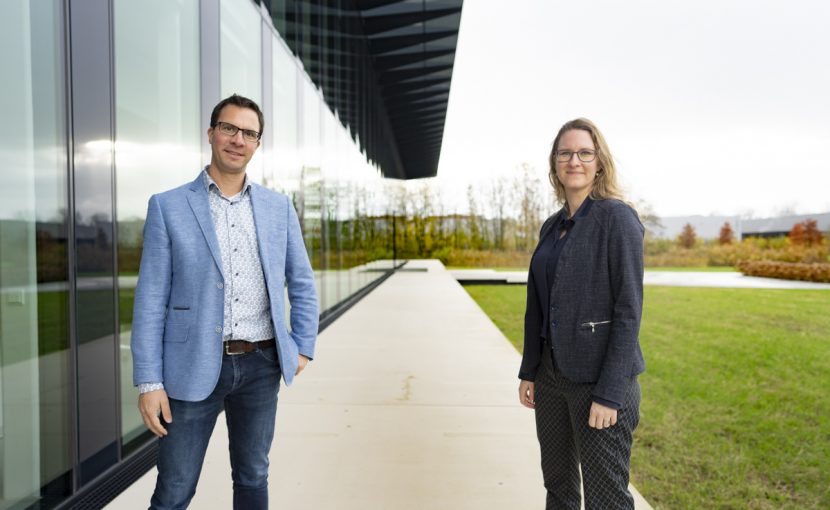Late last year Milou Dingemans and Ruud Bartholomeus were appointed as the new Chief Science Officers (CSOs) at KWR. We talked to them to find out what their focus will be in making a valuable contribution to knowledge for water practice.
Although they have only just started, Milou Dingemans and Ruud Bartholomeus are already moving ahead quickly in fleshing out the details of their role. ‘In conducting research for the water sector, KWR is placed at the centre of society,’ says Dingemans. ‘If we become even more visible to policy-makers, we can also help make an impact in that context by establishing the link with water practice.’ Her fellow researcher Bartholomeus adds: ‘As a knowledge institute, our task is not simply to generate answers to questions, but also to think ahead strategically. What awaits the water sector over the longer term?’
Multidisciplinary research
Both water researchers work with heart and soul on translating science to practice. Dingemans made the switch from Utrecht University to KWR over four years ago: ‘As a toxicologist, I am consciously engaged with what happens with the knowledge generated by research. The results are for example adopted pretty quickly in the assessment of compounds and by public health policy. This means you have to take the big picture into account, which could involve numerable interests. This calls for multidisciplinary research, which is something I found at KWR.’
Robust water system
Bartholomeus has been part of KWR for quite a few years. The hydrologist started his doctoral research at the institute in 2005, and from 2009 held the position of researcher. ‘I am always looking for the link between the conduct of scientific research and its relevance. The outcomes of my research are for instance anchored in tools like WaterVision Nature and WaterVision Agriculture, which are now used nationally in ensuring the robust organisation of the water system. It is not simply about the science, but also about how you can embed that knowledge in the society.’
Young researchers
It is striking how often the word ‘connection’ comes up in the talk with Bartholomeus and Dingemans. ‘We want to inspire all our colleagues to play their part in achieving the societal objectives KWR is working on,’ says Bartholomeus. ‘Young researchers who come here as fresh arrivals throw themselves into the science; and the moment they appreciate its relevance their involvement is reinforced.’ The more experienced researchers can provide an example and engage the newer colleagues in their water research and projects. For Dingemans this creates an added value. ‘By connecting colleagues and disciplines you get further. Together we are greater than the sum of our parts. This is a role I want to take on as a quality assurer.’
Collaborative research
The new CSOs believe that working from a scientific base requires constant attention. Bartholomeus: ‘It is important that we keep generating knowledge together with universities and other partners. This enables us to translate it to practice and policy. What helps is to connect knowledge by participating in collaborative research. KWR is a research institute of the drinking water utilities, but we also work for many other parties, such as industry, Water Authorities, provinces and the national government. With regard to the latter, it is sometimes true that we could become more part of the picture alongside the agencies that hold formal government responsibilities. In collaborative arrangements we can in fact offer additional insights, because we have a large network and work very closely with water practice.’
Scientific Council
As CSOs, Dingemans and Bartholomeus also chair KWR’s Scientific Council, which is responsible for assuring the quality of KWR’s scientific research results and its research agenda. When asked where they would like to see their institute excel, both CSOs are unequivocal. They don’t point to any specific professional field, because they know that the substantive foundation is well anchored in their colleagues’ expertise. Instead, they emphasise the importance of deploying KWR’s scientific base for societal objectives, such as achieving a ‘climate-proof and water-robust’ Netherlands and ‘clean water for all’ (SDG6).
‘We don’t work from an ivory tower,’ explains Bartholomeus. ‘We do research and we communicate the outcomes well. Through our discussions with policy-makers and water practitioners, they effectively absorb the research results and their relevance. Thanks to our historical connection with the water utilities, this process has become second nature to us. We have a good feel for the different users of the water system, and the related interests. Our work amounts to a lot more than writing scientific papers and reports.’
Water sector horizon scan
What message do the CSOs wish to convey in their new role, both to KWR itself and to the water sector as a whole? ‘It would be wonderful if our colleagues were to see themselves as ambassadors, and propagate the contributions that KWR can make to society,’ says Dingemans. And in order to present a clear position to the outside world, adds Bartholomeus, it is useful to develop the collective line internally, in a process in which everyone has an input. ‘I think that a good example of this is the horizon scanning, within the framework of the Joint Research Programme with the water utilities. In this, we track developments that are pertinent to the water sector, with an eye to future developments. I would like to see such research spread like an oil slick throughout the entire organisation. And to see us flexibly accompany the developments, as called on by the Netherlands and the world.’
Would you like to know more about KWR’s new CSOs? Dingemans and Bartholomeus will be speaking on the occasion of the BTO Festival (8-11 February) about their scientific vision and the application of knowledge in water practice.

Ruud Bartholomeus and Milou Dingemans.
